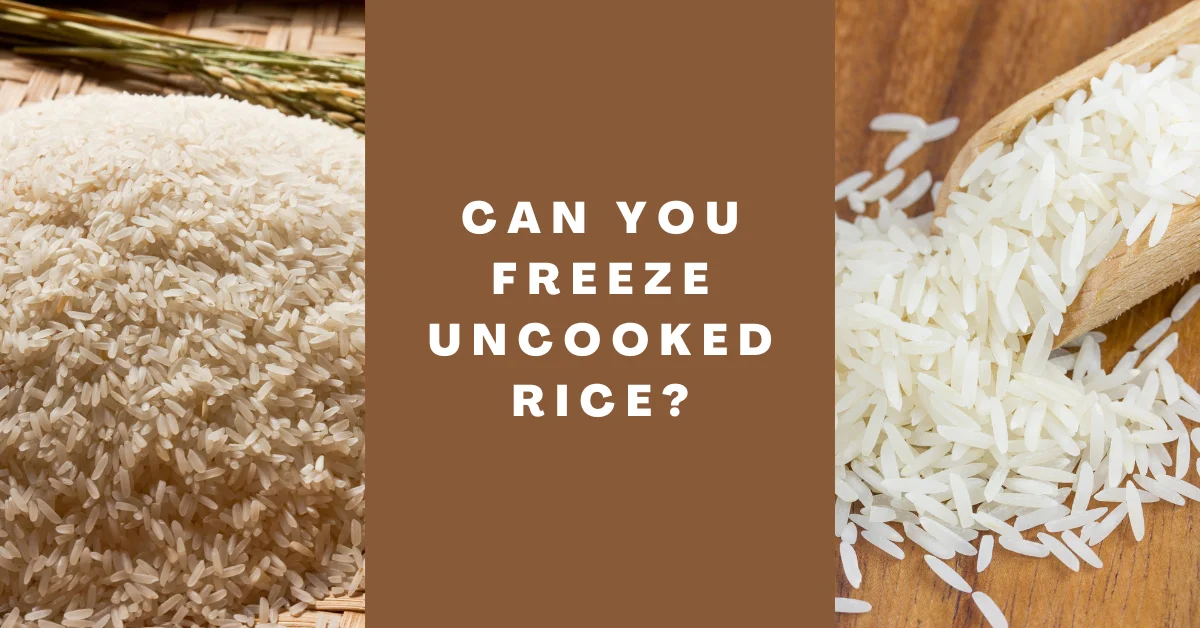Are you someone who rarely cooks rice? Do you face problems while storing it? It can be challenging to store rice while avoiding humidity or bugs, etc. Well, can you freeze uncooked rice? Of course, you can! Freezing uncooked rice ensures shelf-life longevity and keeps it bug-free. Most types of rice, when frozen, can last up to 30 months or even more, except for brown rice. The best way is to freeze rice in air-tight and dry packaging.
Keep on reading to know how to efficiently and effectively freeze uncooked rice so that it lasts decades.
Can you freeze uncooked rice?
Yes, you can freeze uncooked rice. All rice can last up to 30 years in a freezer except brown rice that rots after 18 months. The best way to freeze uncooked rice is to simply put the rice in a plastic airtight bag and place it in the freezer.
If you have already consumed some rice and want to freeze the remainder for later use, then here are some guidelines on how can you freeze uncooked rice:
- Make sure you get a container that is dry and has an airtight lid or an easily sealable bag. Put your rice in this bag/container.
- If you are using a plastic bag, it is essential to let out as much air as you can before placing your rice in it.
- When you are using a container, you need to make sure that it has a very tight lid to avoid the decomposition of your rice.
- You should always label the container/ bag with the date and type of rice you stored. This is because not all rice has the same shelf life, for example, white rice lasts longer than brown rice.
- If you are using freezer bags, then you need to lay them flat on the freezer surface to help with the defrosting process if the need arises.
Can rice expire?
Rice tends to last for almost decades but only if it is stored in a proper way. It may go bad if it is not frozen the right way. Humidity is an external factor that triggers the rice to mold. Rice also needs to be kept in a place with little to no oxygen and light. Therefore, you should store rice in a dry and cool place.
Another issue that spoils the rice is the presence of bugs and sometimes rodents. Rodents are an issue depending on your locality and may not be a pressing issue for most of you. Bugs, however, are something you should always be wary of, especially while storing rice.
How can you spot rotten or spoilt brown rice?
If you find any bugs in your rice, discard the rice immediately and disinfect your containers. When brown rice expires, you can easily tell as it starts to give out a putrid odor and may become oily.
You need to be able to tell if your rice has decomposed to avoid foodborne illnesses. You should be careful of rice weevil’s presence which is a small bug of reddish-brown color. Since brown rice has a relatively low shelf life of only 18 months in cold storage you should check for the above-mentioned signs.
How can you properly store rice for the long-term?
Storing rice for long-term usage can be an issue if you don’t know the proper etiquette.
To keep the longevity of rice in storage, you need to make sure that the low temperature. The most recommended temperature to avoid deterioration of rice is 4 °C (40 °F) or below. You can keep the rice in a place with a temperature of 21°C (70 °F), in case you can’t find storage space within the recommended temperature. However, as a preventive measure, you will need to use oxygen absorbers to avert the spoilage of rice.
To properly store rice for long-term purposes, the easiest and best way possible is to put it in a freezer. Whether you have brown rice or white rice, this technique works for all types.
Benefits of freezing uncooked rice
Here are some benefits of freezing uncooked rice:
- You don’t need to go through the hassle of maintaining the right temperature conditions for rice storage.
- Freezing helps to keep the rice-free from bugs and bug-eggs which are hazardous when eaten.
- It will prevent your rice from dust too.

How to store bug-free rice?
You need to be very careful about bugs because they often go unnoticed. Bug eggs are another factor that you need to be cautious about. These may be present before or even after you buy the rice. Bug eggs are difficult to spot too. You need to freeze rice for at least a week after you buy it to make sure the bug eggs do not grow during storage. Freezing will provide a temperature below zero thus killing any bug eggs present.
Your rice can get infested with bugs even after you bring it home. To avoid any damage to your rice by bugs, these are a few preventive steps you can follow:
- Store your rice in food-safe airtight containers. Make sure you seal the containers tightly. All types of containers with sealable and tight lids will do the job. These containers could be made of glass, plastic, or even steel.
- You can line the shelves where you’ll be storing the rice with chili peppers to avoid bugs. Other than that, you can even put the chili peppers directly into the rice container by wrapping them in a cloth.
- Bay leaves are good at keeping bugs away. Therefore, you can add a few of them to your rice storage containers.
- Make sure your pantry is dry and clean at all times to avoid any bug-related issues.
How can you properly defrost uncooked rice?
Defrosting rice is a very effortless process as it requires little to no time at all. In contrast to other products which need a long time to thaw, you can easily defrost rice within minutes. If you are in a hurry to make dinner you need not wait at all as you can directly put the rice in. If you are not in a rush and have plenty of time, then it is always a better idea to let the rice sit for a while after taking it out of the freezer. It will help you avoid cooking with rice that is icy, which may be an issue for some.
How to store rice in bulk?
Storing rice in bulk may seem like an unconventional idea to you but it does have its own perks. Here are a few suggestions on how you can store rice in bulk:
- You can store it in a freezer if you have a large one. You should preferably divide the bulk rice into smaller portions and then store those portions in the freezer. To freeze the rice in smaller portions, you can use plastic bags that can be permanently sealed either with a special device or even iron/foil.
- In case you do not have a large enough freezer, your next best option is to store the bulk rice at room temperature. There are numerous ways to store rice at room temperature to ensure a long shelf life. You can use soda bottles, jars used for pickling, airtight plastic bags, and very reliable mylar bags.
Wrapping it up
So, can you freeze uncooked rice? The answer to this question is very simple: Yes! You should definitely freeze uncooked rice to increase its shelf-life, keep it bug-free, and prevent it from deteriorating. We hope you loved this article!
For you to continue reading, we have hand-picked this article on how to freeze goat milk at home!



